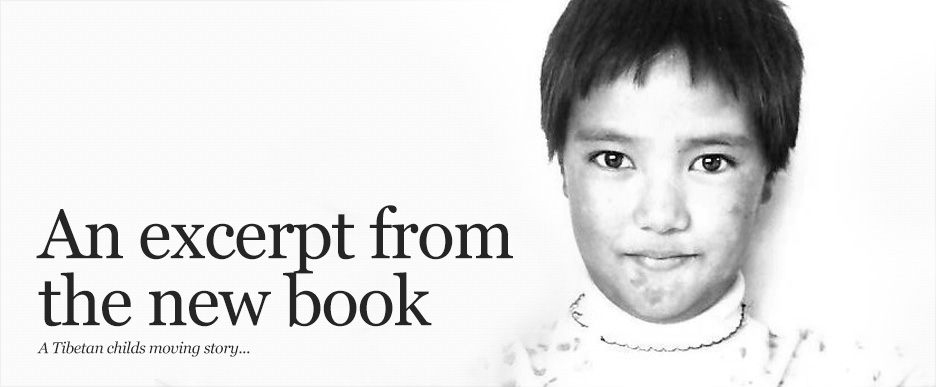I am 10 years old. I was born in a place called Thingre, near Lhasa. My dear mother’s name is Tsering and my father’s name is Bolo. I think this is a good name for him – it is easy to say and remember, and it suits my father very much. I have five brothers and sisters, all older than me; I like being the youngest in our family as I was looked after well. My eldest brother is called Sonam and he is now in Sera Monastery in India.
Sonam decided to escape from the Chinese (who are wicked to Tibetans) to become a monk. They found out and were very angry with us, arresting father and my second eldest brother because they had helped Sonam escape. They gathered our family together in our yard and interrogated my father and brother in front of us, treating them roughly so that they would confess to helping Sonam escape. But father and my brother refused to admit to anything. This made the Chinese more angry, so they hit my brother and he cried out in pain. Father shouted at them to stop, but they didn’t care to listen.
They ordered my brother to kneel down and bow his head at the feet of the soldier in charge. A Chinese soldier put a gun to my brother’s head and shot him. He shot him dead in front of us. I remember this. I will never forget it until my life ends. My brother just fell in a heap to the ground. Father was crying and mother and my sisters were in a very bad state. I wanted to comfort them, but was too terrified to move.
I felt great pain in my body seeing my brother lying on the ground. Father begged for his son’s life, but they just laughed at him and, from the look on their faces, I knew they enjoyed being cruel and hurting my family. I wished I had been bigger and a Tibetan soldier as I could have protected my brother. I am quite big for my age, but still, I’m just 11, so what could I have done?
One sister is married and lives happily with her husband in a neighbouring village and another sister works as a servant to the Chinese in Lhasa. My third sister works in Dam, building roads. This is a hard job for women to do, even Tibetan women who are strong and work in the fields in Tibet. Building roads is definitely the hardest work for women.
When Sonam heard about our brother being murdered, he wrote to father and mother, begging them to send me to India so I would be safe from the Chinese and get a good education, which would be good for our family. I wanted to go as I was so afraid to live in Tibet after the murder of my brother. I couldn't sleep at night, but stayed awake in case the Chinese soldiers came back to our home and took Father away. Often, the Chinese would push their way into our home, searching for pictures of the Dalai Lama and any goods sent from my brother in India. We were sad not to be allowed to have a picture of His Holiness on display in our home. Mother and father kept one hidden, which we took out when we prayed.
One day it rained heavily for a long time, until night. We lost our way and missed the road and didn’t know where we were headed, but walked slowly. Suddenly we came to a Chinese camp. My body felt cold with fear and I shook; I even thought I would vomit through fear. We walked slowly and as carefully as we could past this camp. I was so relieved not to have been caught that I burst into tears. My friend comforted me and assured me that I had a good life waiting for me in India, and that my parents would be very proud of me. These kind words gave me hope and encouragement and I felt much better.
After walking alongside a river for many hours, we came to a place called Barapis, in Nepal, and from here we managed to get a lift in a passing truck, which gave us a chance to rest. After a short time we had to walk again for a whole night to reach the Tibetan transit camp in Katmandu. We reached the camp and, after resting for a few days, my friend said goodbye to me, promising to inform my parents that my escape was successful and not to worry about me.
I often feel lonely and sad. It is hard to feel happy – to play, laugh and joke with my new friends – as my thoughts are with my parents and my brother that was murdered. I remember my homeland, Tibet, where I was born, and wonder if I will remember it still when I am a man. Even now it’s difficult to remember the faces of my family, as I don’t have any photographs of them. I know they think about me and pray for me. I try to work hard and be a good student, but when I feel sad I can’t do any work. I just want to lie in my bed. My home mother is very kind. She loves all of us and cuddles me, saying that it is not a good habit to lay in bed and that I will get sick.
Sometimes I cry myself to sleep.

